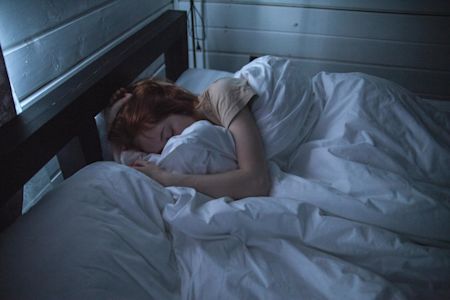The secret to falling asleep fast
If you struggle to fall asleep quickly, try these tips from insomnia expert Kathryn Pinkham.
Sign up to The Body Coach newsletter to get inspiration in your inbox every Monday.

In this guest blog, Dr Louise Newson discusses how your sleep may be disrupted during menopause and perimenopause and ways you can combat that.
Sleep is central to your general health and wellbeing.
It reduces inflammation, promotes wound-healing and repair, supports your immune system and helps you to regulate blood sugar levels and maintain a healthy weight. Sleep is also key for your brain health: poor sleep affects your short-term memory and helps to safeguard against stress, anxiety and depression.
Sleep can prove a challenge at various times of life, but perimenopause and menopause can be particularly trying. In fact, menopausal women report insomnia as one of their most common symptoms.
So many women I see in my clinic complain of fatigue, sleeplessness or early waking. For many women, poor sleep is a result of the hormone changes during perimenopause and menopause, and the symptoms this can trigger.
Symptoms such as night sweats can be really disruptive - before the penny dropped that I was perimenopausal, I used to wake up in the middle of the night drenched in sweat and would have to change my bedding and pyjamas because I was so hot and uncomfortable.
Hormone changes can also trigger numerous urinary symptoms, including urinary tract infections and nocturia - an urge to go to the toilet at nighttime. These symptoms can lead to frequent waking or can make it hard to get to sleep in the first place.
The psychological symptoms associated with menopause can also impact sleep. Many women with low mood or anxiety tell me that their mind races as soon as their head hits the pillow, or they wake up at the crack of dawn worrying about the day ahead.
If you have children, or have a job that involves night shifts, then you’ll likely be familiar with the crushing tiredness that comes with sleep deprivation, where your sleep pattern is disrupted and you simply don’t get enough sleep.
The knock-on effect of physical and psychological menopause symptoms can feel quite similar: women will often tell me how they have experienced memory slips when giving an important presentation at work the morning after a bad night’s sleep, or are simply too shattered to spend time with loved ones.
Replace your missing hormones. If you are experiencing sleep problems during perimenopause and menopause, then the first step is to talk to a healthcare professional. Hormone replacement therapy (HRT) is the first line treatment for the management of perimenopause and menopause symptoms. Studies have suggested that HRT improves sleep quality, enables falling asleep and decreases night-time wakefulness.
Many women take micronised progesterone as part of their HRT regimen: this is a natural sedative that can cause drowsiness, so if this is part of your HRT regimen, you could try taking your micronised progesterone close to bedtime. Also, many women find that taking testosterone improves sleep, as well as improves mood, stamina and libido.
Exercise your way to better sleep. Various studies suggest moderate physical exercise is an effective non-pharmacological treatment for sleep disorders. While researchers don’t know exactly how it improves sleep, they do know that moderate aerobic exercise increases the amount of deep sleep you get, which is when your brain and body are in recovery mode.
Exercise also helps with depression and anxiety, which in themselves can be barriers to sleep. During the perimenopause and menopause, many women report psychological symptoms such as anxiety so if this is the cause of your sleep problems, exercise can be an effective way of managing it.
You could start by adding some yoga or light stretching and breathing exercises to your bedtime routine - give it time and see if it has a positive effect on your sleep, no matter how small. Then add in aerobic or higher intensity exercise earlier in your day. It doesn’t need to be a long session but anything that raises your body’s core temperature will signal to your body clock that it’s time to be awake, and will help regulate your body’s circadian rhythm.
Don’t rely on ‘catching up’ on lost sleep. It can be tempting to think you can ‘catch up’ on a poor night’s sleep by going to bed earlier the following evening, or by having an extra-long lie in at the weekend. However, if you find yourself in a cycle where your sleep is regularly disrupted, building a consistent bedtime is key. Aim to have the same bedtime and wake up time every day of the week: doing this will set your body’s internal clock, known as the circadian rhythm.
Create the ideal sleep environment. Try using a dimmer switch in your living room to slowly dim the lights as bedtime approaches. A lukewarm shower before bed can help, and if night sweats are an issue, try cotton bedding and nightwear to keep skin cool and wick away sweat from your body. A fan on a low setting can also keep room temperature down without being too noisy.
Curb your screen time. If you wake up in the night, don’t be tempted to reach for your phone - smartphone and computer screens emit blue light, which can affect your body's production of the sleep hormone melatonin.
Dr Louise Newson is a GP and Menopause Specialist and founder of Newson Health, the balance menopause support app and author of the Sunday Times bestseller The Definitive Guide to the Perimenopause and Menopause. Tickets for her UK theatre tour, Hormones and Menopause: The Great Debate, are on sale now.